Case Study: Critical Reasoning in Post-operative Management of Mr. Ted
VerifiedAdded on 2022/07/28
|12
|3393
|55
Case Study
AI Summary
This case study analyzes the post-operative care of Mr. Ted, an elderly patient undergoing bowel resection surgery. It examines the application of critical reasoning in assessing his condition, identifying potential complications, and developing a comprehensive nursing care plan. The case study highlights the importance of considering Mr. Ted's medical history, psychosocial factors, and pre-operative status, including his diabetes, hypertension, and gout. It focuses on nursing goals such as restoring hydration, providing psychological support, managing blood glucose levels, and preventing post-operative complications. The assignment details nursing interventions like fluid therapy, monitoring vital signs, and electrolyte balance, emphasizing the importance of patient-controlled analgesia (PCA) for pain management and antiemetics for nausea. The analysis includes discussions on potential complications like dehydration, hypovolemia, and electrolyte imbalances, along with appropriate interventions. The case study also includes a review of the provided PCA chart and patient education materials.
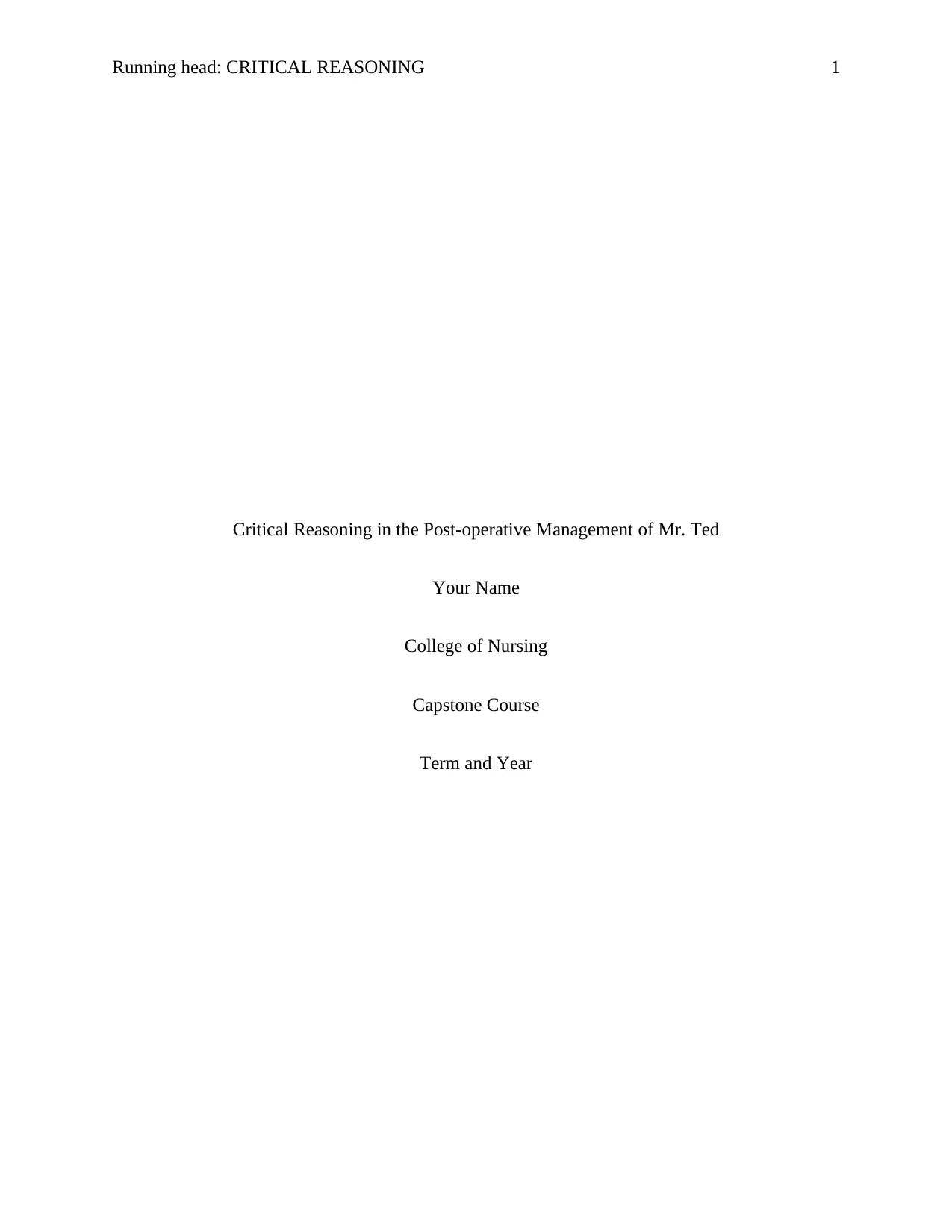
Running head: CRITICAL REASONING 1
Critical Reasoning in the Post-operative Management of Mr. Ted
Your Name
College of Nursing
Capstone Course
Term and Year
Critical Reasoning in the Post-operative Management of Mr. Ted
Your Name
College of Nursing
Capstone Course
Term and Year
Paraphrase This Document
Need a fresh take? Get an instant paraphrase of this document with our AI Paraphraser
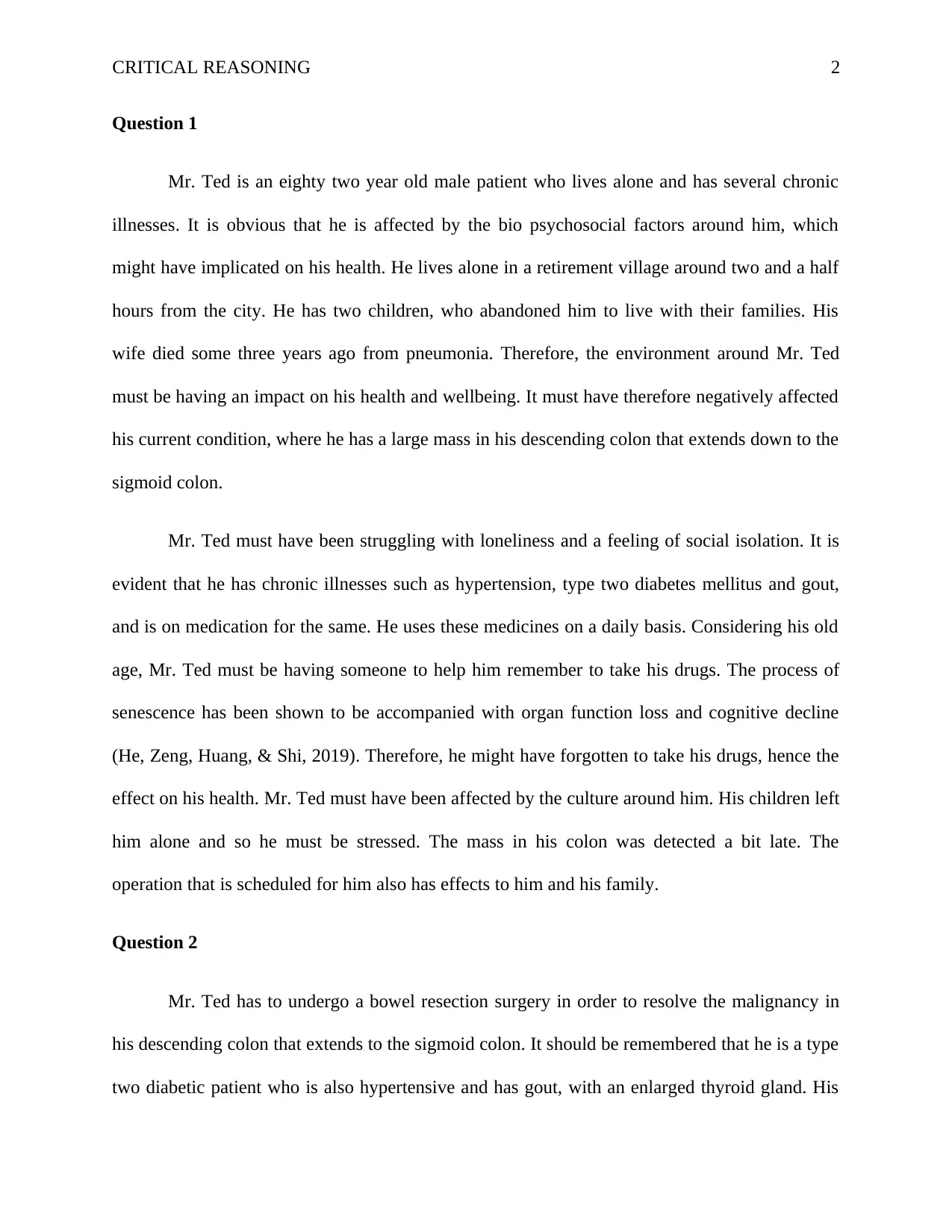
CRITICAL REASONING 2
Question 1
Mr. Ted is an eighty two year old male patient who lives alone and has several chronic
illnesses. It is obvious that he is affected by the bio psychosocial factors around him, which
might have implicated on his health. He lives alone in a retirement village around two and a half
hours from the city. He has two children, who abandoned him to live with their families. His
wife died some three years ago from pneumonia. Therefore, the environment around Mr. Ted
must be having an impact on his health and wellbeing. It must have therefore negatively affected
his current condition, where he has a large mass in his descending colon that extends down to the
sigmoid colon.
Mr. Ted must have been struggling with loneliness and a feeling of social isolation. It is
evident that he has chronic illnesses such as hypertension, type two diabetes mellitus and gout,
and is on medication for the same. He uses these medicines on a daily basis. Considering his old
age, Mr. Ted must be having someone to help him remember to take his drugs. The process of
senescence has been shown to be accompanied with organ function loss and cognitive decline
(He, Zeng, Huang, & Shi, 2019). Therefore, he might have forgotten to take his drugs, hence the
effect on his health. Mr. Ted must have been affected by the culture around him. His children left
him alone and so he must be stressed. The mass in his colon was detected a bit late. The
operation that is scheduled for him also has effects to him and his family.
Question 2
Mr. Ted has to undergo a bowel resection surgery in order to resolve the malignancy in
his descending colon that extends to the sigmoid colon. It should be remembered that he is a type
two diabetic patient who is also hypertensive and has gout, with an enlarged thyroid gland. His
Question 1
Mr. Ted is an eighty two year old male patient who lives alone and has several chronic
illnesses. It is obvious that he is affected by the bio psychosocial factors around him, which
might have implicated on his health. He lives alone in a retirement village around two and a half
hours from the city. He has two children, who abandoned him to live with their families. His
wife died some three years ago from pneumonia. Therefore, the environment around Mr. Ted
must be having an impact on his health and wellbeing. It must have therefore negatively affected
his current condition, where he has a large mass in his descending colon that extends down to the
sigmoid colon.
Mr. Ted must have been struggling with loneliness and a feeling of social isolation. It is
evident that he has chronic illnesses such as hypertension, type two diabetes mellitus and gout,
and is on medication for the same. He uses these medicines on a daily basis. Considering his old
age, Mr. Ted must be having someone to help him remember to take his drugs. The process of
senescence has been shown to be accompanied with organ function loss and cognitive decline
(He, Zeng, Huang, & Shi, 2019). Therefore, he might have forgotten to take his drugs, hence the
effect on his health. Mr. Ted must have been affected by the culture around him. His children left
him alone and so he must be stressed. The mass in his colon was detected a bit late. The
operation that is scheduled for him also has effects to him and his family.
Question 2
Mr. Ted has to undergo a bowel resection surgery in order to resolve the malignancy in
his descending colon that extends to the sigmoid colon. It should be remembered that he is a type
two diabetic patient who is also hypertensive and has gout, with an enlarged thyroid gland. His
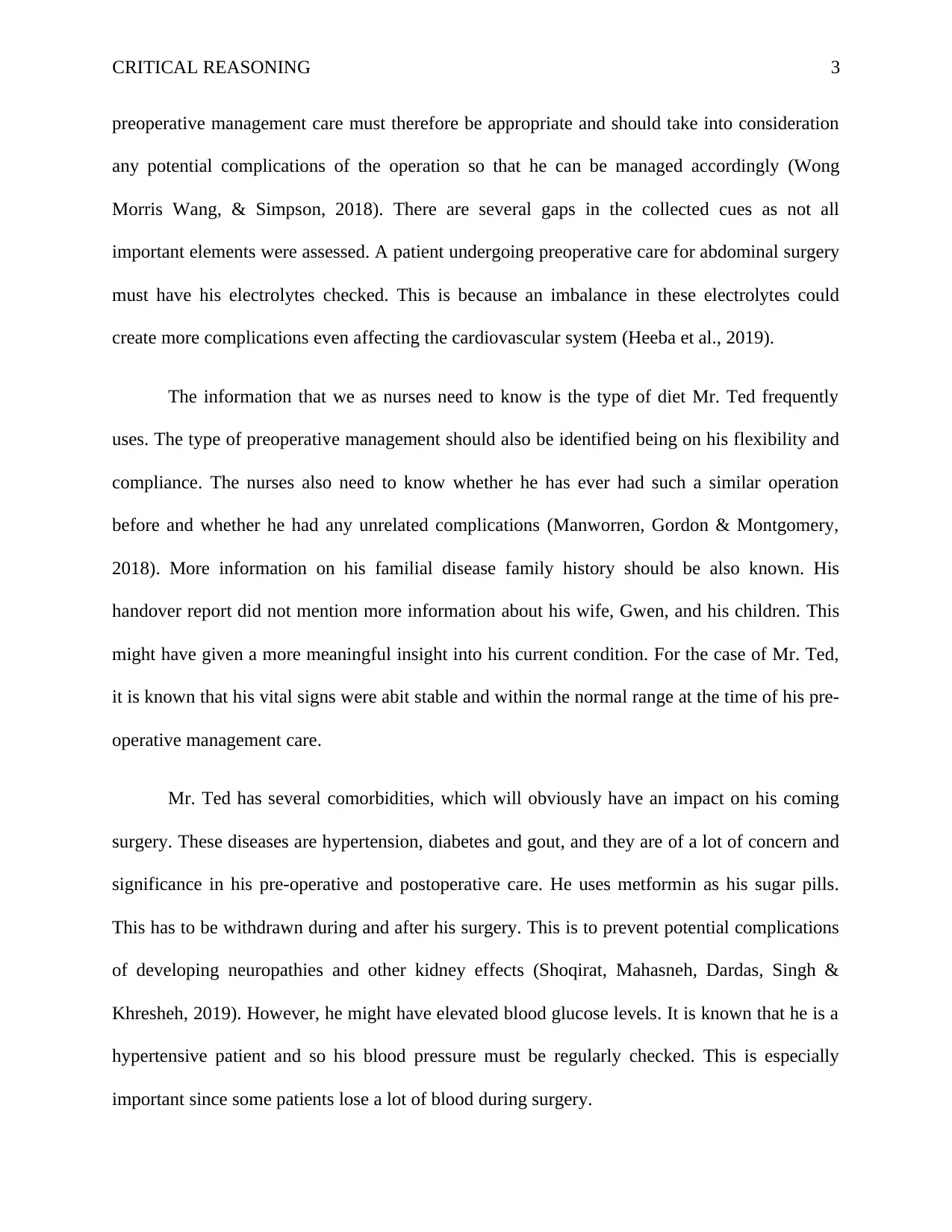
CRITICAL REASONING 3
preoperative management care must therefore be appropriate and should take into consideration
any potential complications of the operation so that he can be managed accordingly (Wong
Morris Wang, & Simpson, 2018). There are several gaps in the collected cues as not all
important elements were assessed. A patient undergoing preoperative care for abdominal surgery
must have his electrolytes checked. This is because an imbalance in these electrolytes could
create more complications even affecting the cardiovascular system (Heeba et al., 2019).
The information that we as nurses need to know is the type of diet Mr. Ted frequently
uses. The type of preoperative management should also be identified being on his flexibility and
compliance. The nurses also need to know whether he has ever had such a similar operation
before and whether he had any unrelated complications (Manworren, Gordon & Montgomery,
2018). More information on his familial disease family history should be also known. His
handover report did not mention more information about his wife, Gwen, and his children. This
might have given a more meaningful insight into his current condition. For the case of Mr. Ted,
it is known that his vital signs were abit stable and within the normal range at the time of his pre-
operative management care.
Mr. Ted has several comorbidities, which will obviously have an impact on his coming
surgery. These diseases are hypertension, diabetes and gout, and they are of a lot of concern and
significance in his pre-operative and postoperative care. He uses metformin as his sugar pills.
This has to be withdrawn during and after his surgery. This is to prevent potential complications
of developing neuropathies and other kidney effects (Shoqirat, Mahasneh, Dardas, Singh &
Khresheh, 2019). However, he might have elevated blood glucose levels. It is known that he is a
hypertensive patient and so his blood pressure must be regularly checked. This is especially
important since some patients lose a lot of blood during surgery.
preoperative management care must therefore be appropriate and should take into consideration
any potential complications of the operation so that he can be managed accordingly (Wong
Morris Wang, & Simpson, 2018). There are several gaps in the collected cues as not all
important elements were assessed. A patient undergoing preoperative care for abdominal surgery
must have his electrolytes checked. This is because an imbalance in these electrolytes could
create more complications even affecting the cardiovascular system (Heeba et al., 2019).
The information that we as nurses need to know is the type of diet Mr. Ted frequently
uses. The type of preoperative management should also be identified being on his flexibility and
compliance. The nurses also need to know whether he has ever had such a similar operation
before and whether he had any unrelated complications (Manworren, Gordon & Montgomery,
2018). More information on his familial disease family history should be also known. His
handover report did not mention more information about his wife, Gwen, and his children. This
might have given a more meaningful insight into his current condition. For the case of Mr. Ted,
it is known that his vital signs were abit stable and within the normal range at the time of his pre-
operative management care.
Mr. Ted has several comorbidities, which will obviously have an impact on his coming
surgery. These diseases are hypertension, diabetes and gout, and they are of a lot of concern and
significance in his pre-operative and postoperative care. He uses metformin as his sugar pills.
This has to be withdrawn during and after his surgery. This is to prevent potential complications
of developing neuropathies and other kidney effects (Shoqirat, Mahasneh, Dardas, Singh &
Khresheh, 2019). However, he might have elevated blood glucose levels. It is known that he is a
hypertensive patient and so his blood pressure must be regularly checked. This is especially
important since some patients lose a lot of blood during surgery.
⊘ This is a preview!⊘
Do you want full access?
Subscribe today to unlock all pages.

Trusted by 1+ million students worldwide
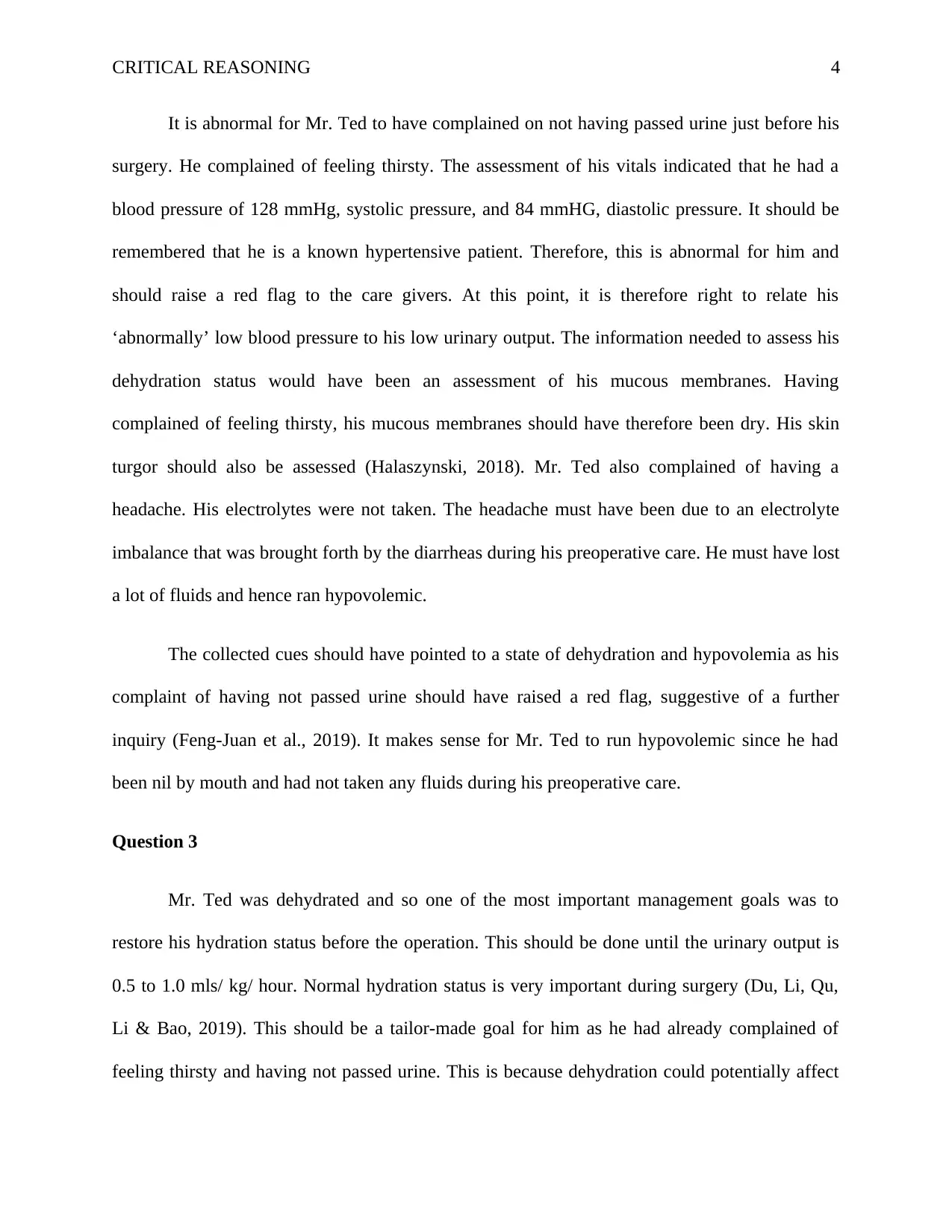
CRITICAL REASONING 4
It is abnormal for Mr. Ted to have complained on not having passed urine just before his
surgery. He complained of feeling thirsty. The assessment of his vitals indicated that he had a
blood pressure of 128 mmHg, systolic pressure, and 84 mmHG, diastolic pressure. It should be
remembered that he is a known hypertensive patient. Therefore, this is abnormal for him and
should raise a red flag to the care givers. At this point, it is therefore right to relate his
‘abnormally’ low blood pressure to his low urinary output. The information needed to assess his
dehydration status would have been an assessment of his mucous membranes. Having
complained of feeling thirsty, his mucous membranes should have therefore been dry. His skin
turgor should also be assessed (Halaszynski, 2018). Mr. Ted also complained of having a
headache. His electrolytes were not taken. The headache must have been due to an electrolyte
imbalance that was brought forth by the diarrheas during his preoperative care. He must have lost
a lot of fluids and hence ran hypovolemic.
The collected cues should have pointed to a state of dehydration and hypovolemia as his
complaint of having not passed urine should have raised a red flag, suggestive of a further
inquiry (Feng-Juan et al., 2019). It makes sense for Mr. Ted to run hypovolemic since he had
been nil by mouth and had not taken any fluids during his preoperative care.
Question 3
Mr. Ted was dehydrated and so one of the most important management goals was to
restore his hydration status before the operation. This should be done until the urinary output is
0.5 to 1.0 mls/ kg/ hour. Normal hydration status is very important during surgery (Du, Li, Qu,
Li & Bao, 2019). This should be a tailor-made goal for him as he had already complained of
feeling thirsty and having not passed urine. This is because dehydration could potentially affect
It is abnormal for Mr. Ted to have complained on not having passed urine just before his
surgery. He complained of feeling thirsty. The assessment of his vitals indicated that he had a
blood pressure of 128 mmHg, systolic pressure, and 84 mmHG, diastolic pressure. It should be
remembered that he is a known hypertensive patient. Therefore, this is abnormal for him and
should raise a red flag to the care givers. At this point, it is therefore right to relate his
‘abnormally’ low blood pressure to his low urinary output. The information needed to assess his
dehydration status would have been an assessment of his mucous membranes. Having
complained of feeling thirsty, his mucous membranes should have therefore been dry. His skin
turgor should also be assessed (Halaszynski, 2018). Mr. Ted also complained of having a
headache. His electrolytes were not taken. The headache must have been due to an electrolyte
imbalance that was brought forth by the diarrheas during his preoperative care. He must have lost
a lot of fluids and hence ran hypovolemic.
The collected cues should have pointed to a state of dehydration and hypovolemia as his
complaint of having not passed urine should have raised a red flag, suggestive of a further
inquiry (Feng-Juan et al., 2019). It makes sense for Mr. Ted to run hypovolemic since he had
been nil by mouth and had not taken any fluids during his preoperative care.
Question 3
Mr. Ted was dehydrated and so one of the most important management goals was to
restore his hydration status before the operation. This should be done until the urinary output is
0.5 to 1.0 mls/ kg/ hour. Normal hydration status is very important during surgery (Du, Li, Qu,
Li & Bao, 2019). This should be a tailor-made goal for him as he had already complained of
feeling thirsty and having not passed urine. This is because dehydration could potentially affect
Paraphrase This Document
Need a fresh take? Get an instant paraphrase of this document with our AI Paraphraser
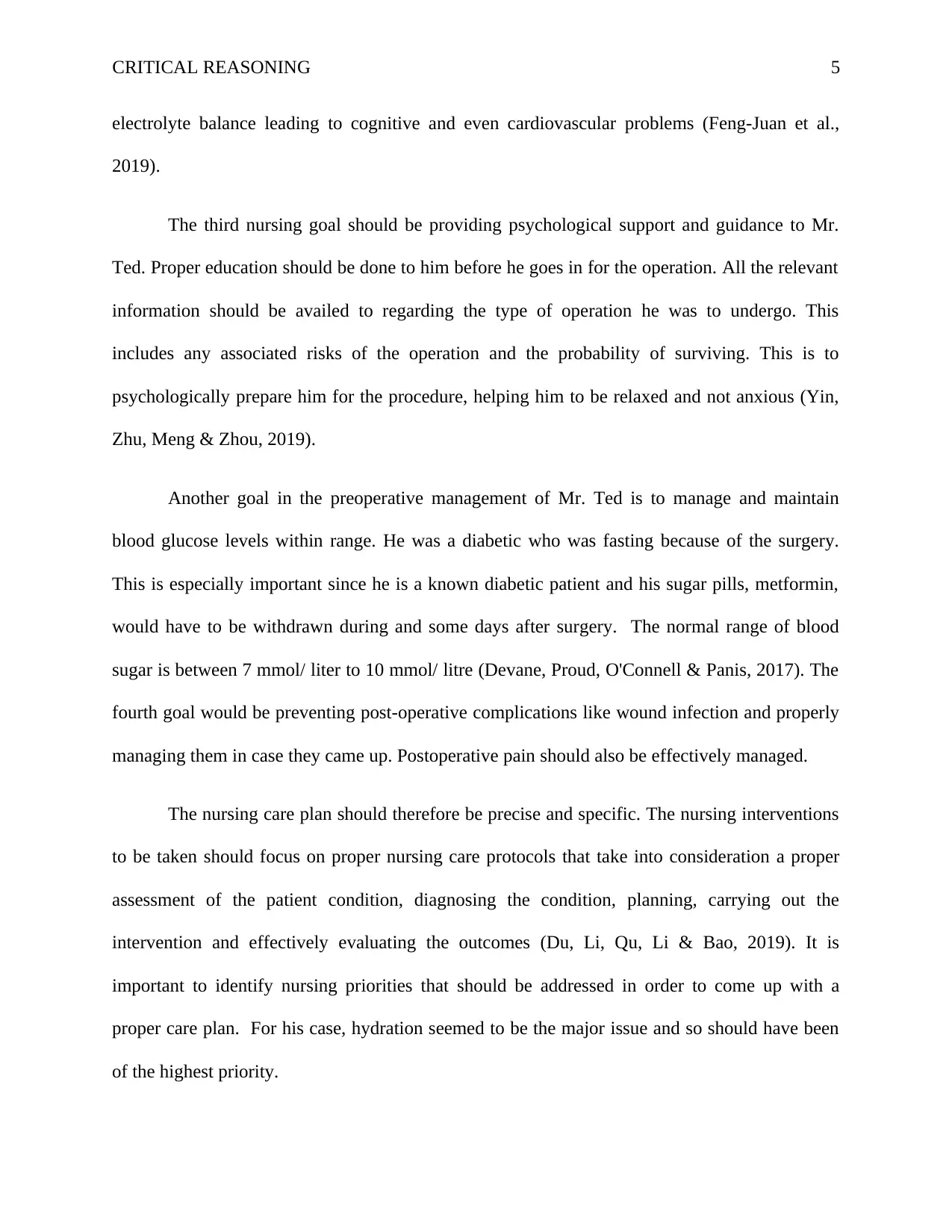
CRITICAL REASONING 5
electrolyte balance leading to cognitive and even cardiovascular problems (Feng-Juan et al.,
2019).
The third nursing goal should be providing psychological support and guidance to Mr.
Ted. Proper education should be done to him before he goes in for the operation. All the relevant
information should be availed to regarding the type of operation he was to undergo. This
includes any associated risks of the operation and the probability of surviving. This is to
psychologically prepare him for the procedure, helping him to be relaxed and not anxious (Yin,
Zhu, Meng & Zhou, 2019).
Another goal in the preoperative management of Mr. Ted is to manage and maintain
blood glucose levels within range. He was a diabetic who was fasting because of the surgery.
This is especially important since he is a known diabetic patient and his sugar pills, metformin,
would have to be withdrawn during and some days after surgery. The normal range of blood
sugar is between 7 mmol/ liter to 10 mmol/ litre (Devane, Proud, O'Connell & Panis, 2017). The
fourth goal would be preventing post-operative complications like wound infection and properly
managing them in case they came up. Postoperative pain should also be effectively managed.
The nursing care plan should therefore be precise and specific. The nursing interventions
to be taken should focus on proper nursing care protocols that take into consideration a proper
assessment of the patient condition, diagnosing the condition, planning, carrying out the
intervention and effectively evaluating the outcomes (Du, Li, Qu, Li & Bao, 2019). It is
important to identify nursing priorities that should be addressed in order to come up with a
proper care plan. For his case, hydration seemed to be the major issue and so should have been
of the highest priority.
electrolyte balance leading to cognitive and even cardiovascular problems (Feng-Juan et al.,
2019).
The third nursing goal should be providing psychological support and guidance to Mr.
Ted. Proper education should be done to him before he goes in for the operation. All the relevant
information should be availed to regarding the type of operation he was to undergo. This
includes any associated risks of the operation and the probability of surviving. This is to
psychologically prepare him for the procedure, helping him to be relaxed and not anxious (Yin,
Zhu, Meng & Zhou, 2019).
Another goal in the preoperative management of Mr. Ted is to manage and maintain
blood glucose levels within range. He was a diabetic who was fasting because of the surgery.
This is especially important since he is a known diabetic patient and his sugar pills, metformin,
would have to be withdrawn during and some days after surgery. The normal range of blood
sugar is between 7 mmol/ liter to 10 mmol/ litre (Devane, Proud, O'Connell & Panis, 2017). The
fourth goal would be preventing post-operative complications like wound infection and properly
managing them in case they came up. Postoperative pain should also be effectively managed.
The nursing care plan should therefore be precise and specific. The nursing interventions
to be taken should focus on proper nursing care protocols that take into consideration a proper
assessment of the patient condition, diagnosing the condition, planning, carrying out the
intervention and effectively evaluating the outcomes (Du, Li, Qu, Li & Bao, 2019). It is
important to identify nursing priorities that should be addressed in order to come up with a
proper care plan. For his case, hydration seemed to be the major issue and so should have been
of the highest priority.
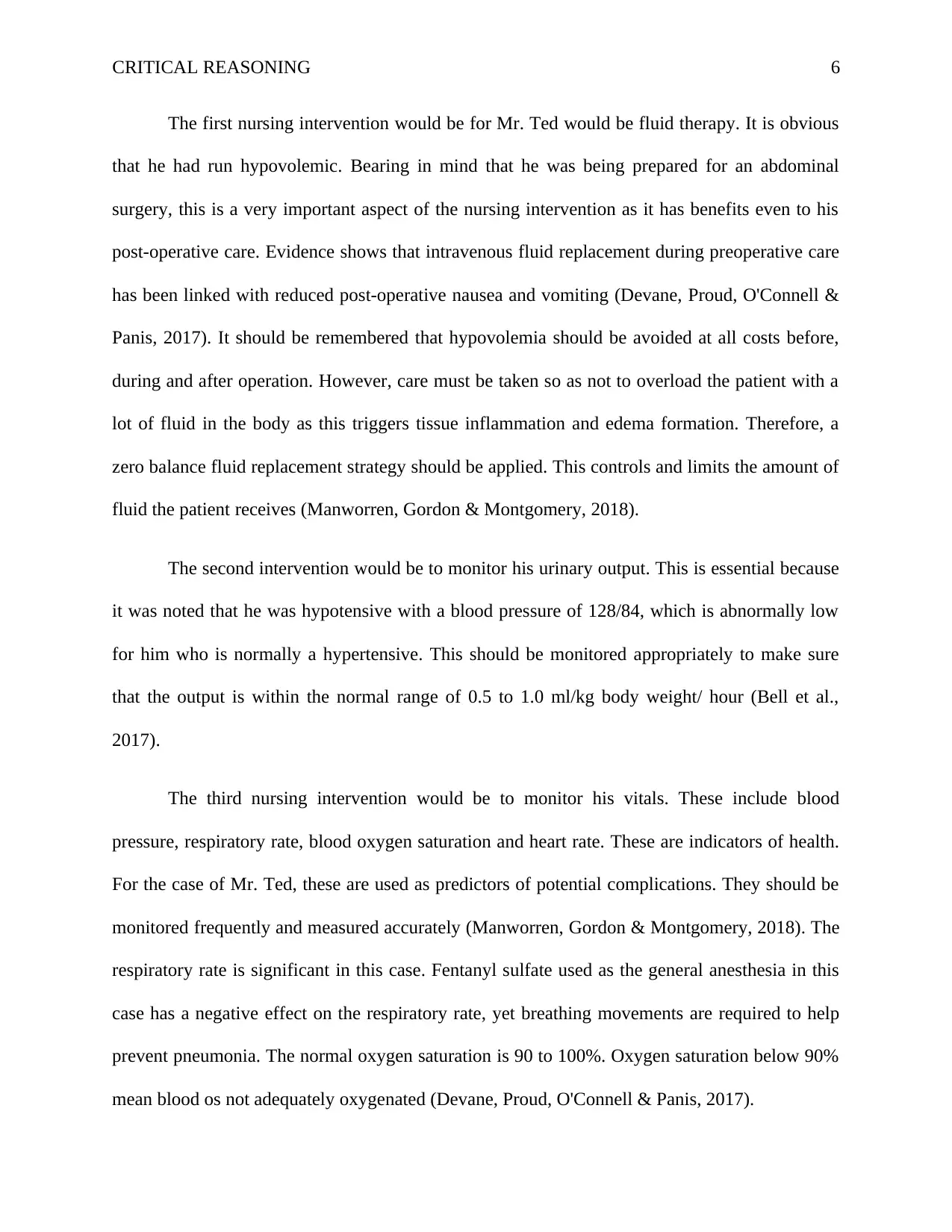
CRITICAL REASONING 6
The first nursing intervention would be for Mr. Ted would be fluid therapy. It is obvious
that he had run hypovolemic. Bearing in mind that he was being prepared for an abdominal
surgery, this is a very important aspect of the nursing intervention as it has benefits even to his
post-operative care. Evidence shows that intravenous fluid replacement during preoperative care
has been linked with reduced post-operative nausea and vomiting (Devane, Proud, O'Connell &
Panis, 2017). It should be remembered that hypovolemia should be avoided at all costs before,
during and after operation. However, care must be taken so as not to overload the patient with a
lot of fluid in the body as this triggers tissue inflammation and edema formation. Therefore, a
zero balance fluid replacement strategy should be applied. This controls and limits the amount of
fluid the patient receives (Manworren, Gordon & Montgomery, 2018).
The second intervention would be to monitor his urinary output. This is essential because
it was noted that he was hypotensive with a blood pressure of 128/84, which is abnormally low
for him who is normally a hypertensive. This should be monitored appropriately to make sure
that the output is within the normal range of 0.5 to 1.0 ml/kg body weight/ hour (Bell et al.,
2017).
The third nursing intervention would be to monitor his vitals. These include blood
pressure, respiratory rate, blood oxygen saturation and heart rate. These are indicators of health.
For the case of Mr. Ted, these are used as predictors of potential complications. They should be
monitored frequently and measured accurately (Manworren, Gordon & Montgomery, 2018). The
respiratory rate is significant in this case. Fentanyl sulfate used as the general anesthesia in this
case has a negative effect on the respiratory rate, yet breathing movements are required to help
prevent pneumonia. The normal oxygen saturation is 90 to 100%. Oxygen saturation below 90%
mean blood os not adequately oxygenated (Devane, Proud, O'Connell & Panis, 2017).
The first nursing intervention would be for Mr. Ted would be fluid therapy. It is obvious
that he had run hypovolemic. Bearing in mind that he was being prepared for an abdominal
surgery, this is a very important aspect of the nursing intervention as it has benefits even to his
post-operative care. Evidence shows that intravenous fluid replacement during preoperative care
has been linked with reduced post-operative nausea and vomiting (Devane, Proud, O'Connell &
Panis, 2017). It should be remembered that hypovolemia should be avoided at all costs before,
during and after operation. However, care must be taken so as not to overload the patient with a
lot of fluid in the body as this triggers tissue inflammation and edema formation. Therefore, a
zero balance fluid replacement strategy should be applied. This controls and limits the amount of
fluid the patient receives (Manworren, Gordon & Montgomery, 2018).
The second intervention would be to monitor his urinary output. This is essential because
it was noted that he was hypotensive with a blood pressure of 128/84, which is abnormally low
for him who is normally a hypertensive. This should be monitored appropriately to make sure
that the output is within the normal range of 0.5 to 1.0 ml/kg body weight/ hour (Bell et al.,
2017).
The third nursing intervention would be to monitor his vitals. These include blood
pressure, respiratory rate, blood oxygen saturation and heart rate. These are indicators of health.
For the case of Mr. Ted, these are used as predictors of potential complications. They should be
monitored frequently and measured accurately (Manworren, Gordon & Montgomery, 2018). The
respiratory rate is significant in this case. Fentanyl sulfate used as the general anesthesia in this
case has a negative effect on the respiratory rate, yet breathing movements are required to help
prevent pneumonia. The normal oxygen saturation is 90 to 100%. Oxygen saturation below 90%
mean blood os not adequately oxygenated (Devane, Proud, O'Connell & Panis, 2017).
⊘ This is a preview!⊘
Do you want full access?
Subscribe today to unlock all pages.

Trusted by 1+ million students worldwide
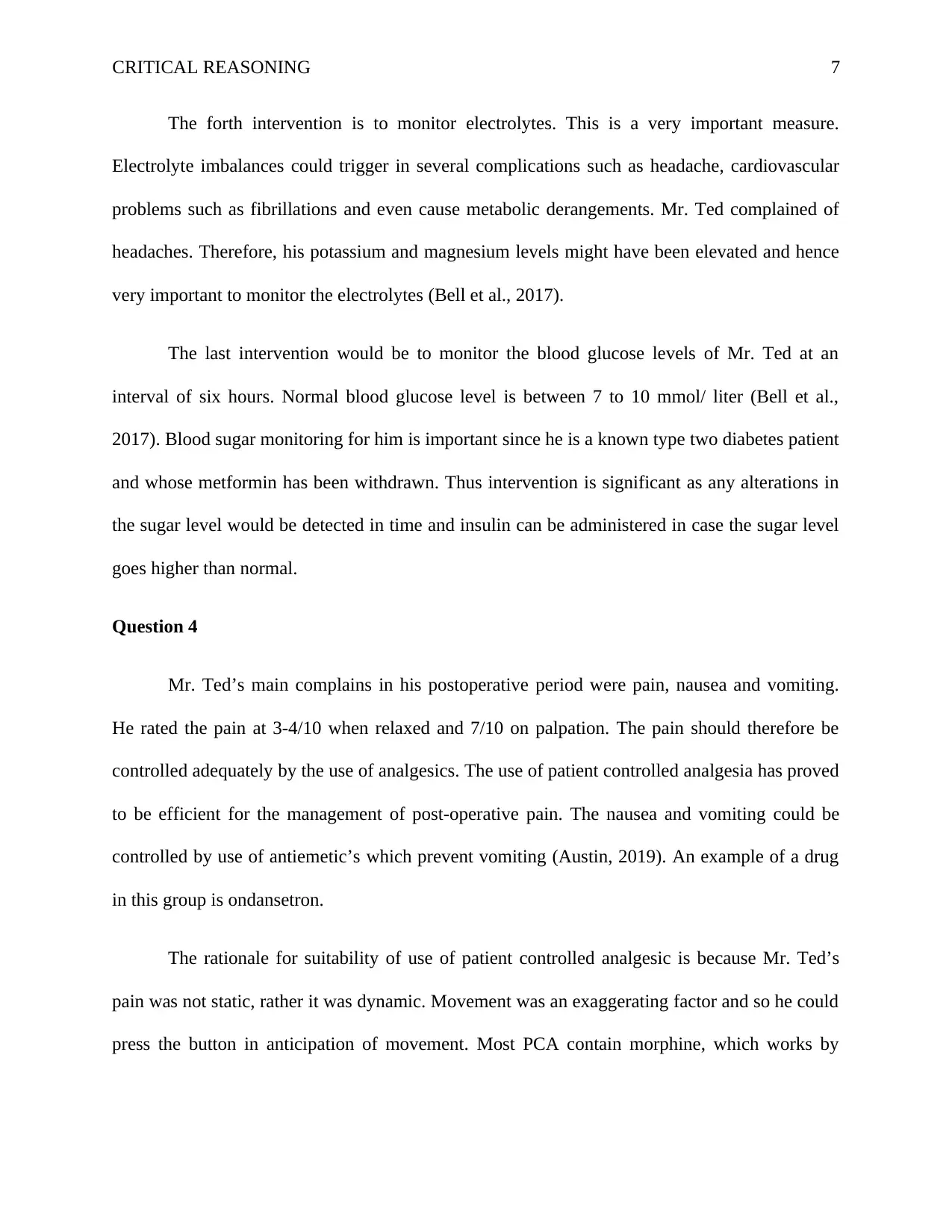
CRITICAL REASONING 7
The forth intervention is to monitor electrolytes. This is a very important measure.
Electrolyte imbalances could trigger in several complications such as headache, cardiovascular
problems such as fibrillations and even cause metabolic derangements. Mr. Ted complained of
headaches. Therefore, his potassium and magnesium levels might have been elevated and hence
very important to monitor the electrolytes (Bell et al., 2017).
The last intervention would be to monitor the blood glucose levels of Mr. Ted at an
interval of six hours. Normal blood glucose level is between 7 to 10 mmol/ liter (Bell et al.,
2017). Blood sugar monitoring for him is important since he is a known type two diabetes patient
and whose metformin has been withdrawn. Thus intervention is significant as any alterations in
the sugar level would be detected in time and insulin can be administered in case the sugar level
goes higher than normal.
Question 4
Mr. Ted’s main complains in his postoperative period were pain, nausea and vomiting.
He rated the pain at 3-4/10 when relaxed and 7/10 on palpation. The pain should therefore be
controlled adequately by the use of analgesics. The use of patient controlled analgesia has proved
to be efficient for the management of post-operative pain. The nausea and vomiting could be
controlled by use of antiemetic’s which prevent vomiting (Austin, 2019). An example of a drug
in this group is ondansetron.
The rationale for suitability of use of patient controlled analgesic is because Mr. Ted’s
pain was not static, rather it was dynamic. Movement was an exaggerating factor and so he could
press the button in anticipation of movement. Most PCA contain morphine, which works by
The forth intervention is to monitor electrolytes. This is a very important measure.
Electrolyte imbalances could trigger in several complications such as headache, cardiovascular
problems such as fibrillations and even cause metabolic derangements. Mr. Ted complained of
headaches. Therefore, his potassium and magnesium levels might have been elevated and hence
very important to monitor the electrolytes (Bell et al., 2017).
The last intervention would be to monitor the blood glucose levels of Mr. Ted at an
interval of six hours. Normal blood glucose level is between 7 to 10 mmol/ liter (Bell et al.,
2017). Blood sugar monitoring for him is important since he is a known type two diabetes patient
and whose metformin has been withdrawn. Thus intervention is significant as any alterations in
the sugar level would be detected in time and insulin can be administered in case the sugar level
goes higher than normal.
Question 4
Mr. Ted’s main complains in his postoperative period were pain, nausea and vomiting.
He rated the pain at 3-4/10 when relaxed and 7/10 on palpation. The pain should therefore be
controlled adequately by the use of analgesics. The use of patient controlled analgesia has proved
to be efficient for the management of post-operative pain. The nausea and vomiting could be
controlled by use of antiemetic’s which prevent vomiting (Austin, 2019). An example of a drug
in this group is ondansetron.
The rationale for suitability of use of patient controlled analgesic is because Mr. Ted’s
pain was not static, rather it was dynamic. Movement was an exaggerating factor and so he could
press the button in anticipation of movement. Most PCA contain morphine, which works by
Paraphrase This Document
Need a fresh take? Get an instant paraphrase of this document with our AI Paraphraser
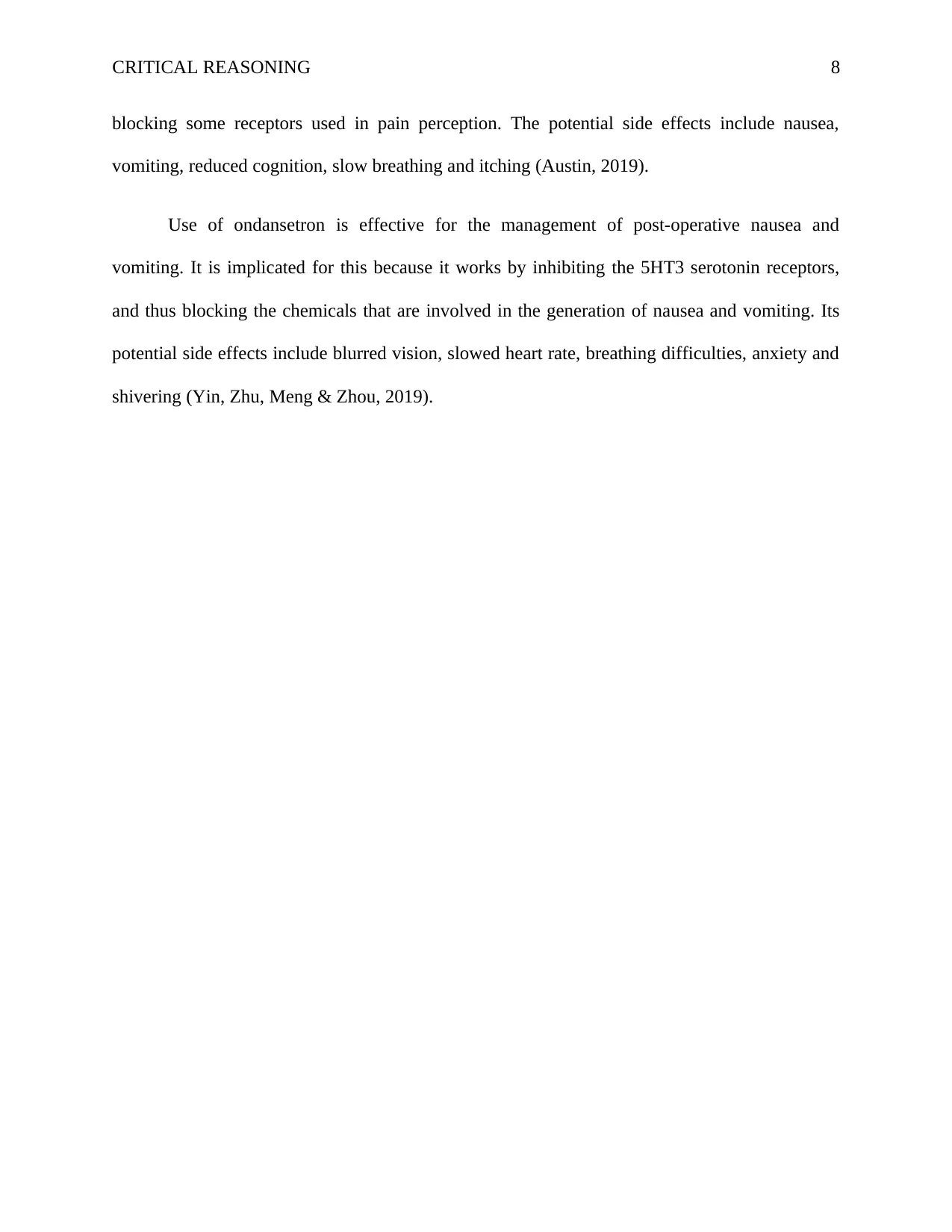
CRITICAL REASONING 8
blocking some receptors used in pain perception. The potential side effects include nausea,
vomiting, reduced cognition, slow breathing and itching (Austin, 2019).
Use of ondansetron is effective for the management of post-operative nausea and
vomiting. It is implicated for this because it works by inhibiting the 5HT3 serotonin receptors,
and thus blocking the chemicals that are involved in the generation of nausea and vomiting. Its
potential side effects include blurred vision, slowed heart rate, breathing difficulties, anxiety and
shivering (Yin, Zhu, Meng & Zhou, 2019).
blocking some receptors used in pain perception. The potential side effects include nausea,
vomiting, reduced cognition, slow breathing and itching (Austin, 2019).
Use of ondansetron is effective for the management of post-operative nausea and
vomiting. It is implicated for this because it works by inhibiting the 5HT3 serotonin receptors,
and thus blocking the chemicals that are involved in the generation of nausea and vomiting. Its
potential side effects include blurred vision, slowed heart rate, breathing difficulties, anxiety and
shivering (Yin, Zhu, Meng & Zhou, 2019).
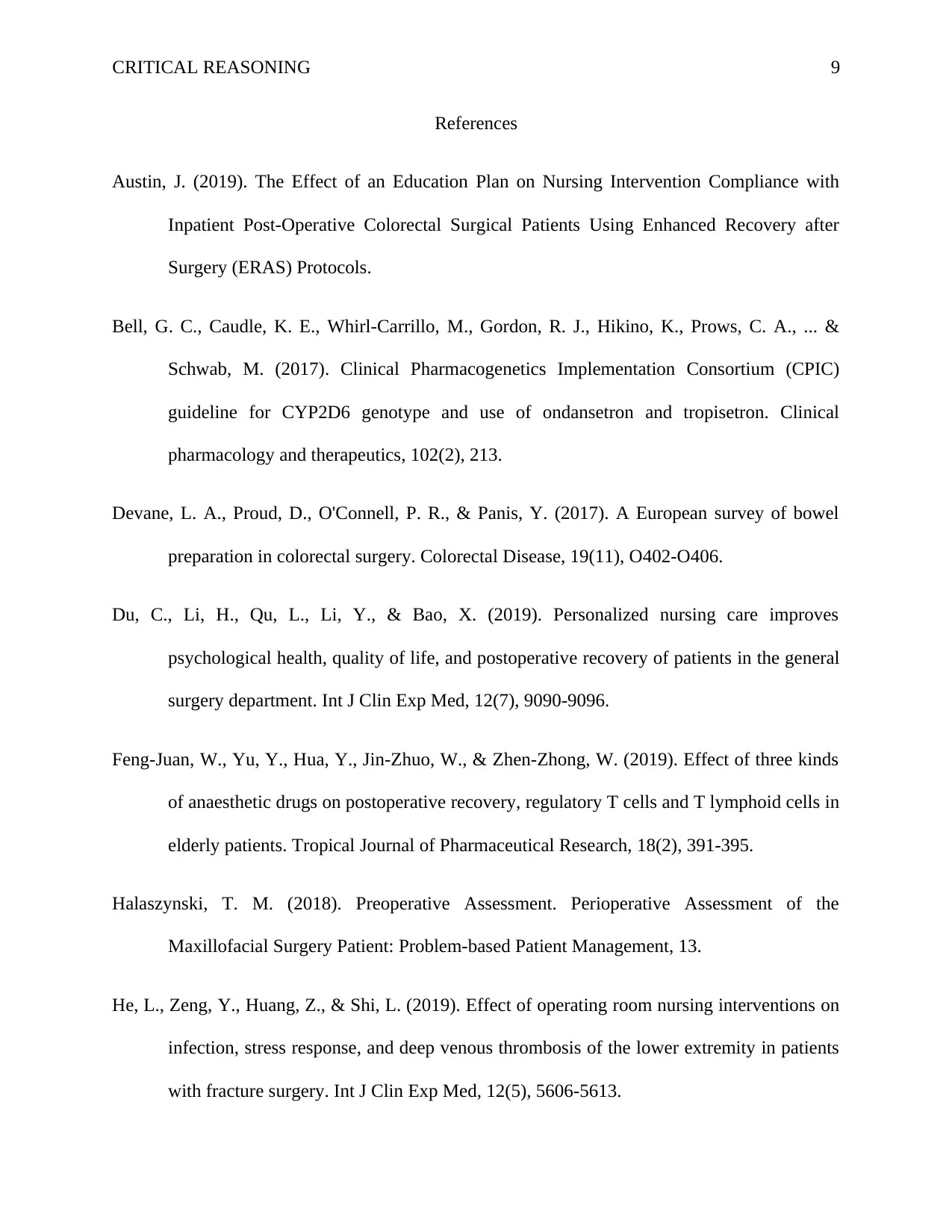
CRITICAL REASONING 9
References
Austin, J. (2019). The Effect of an Education Plan on Nursing Intervention Compliance with
Inpatient Post-Operative Colorectal Surgical Patients Using Enhanced Recovery after
Surgery (ERAS) Protocols.
Bell, G. C., Caudle, K. E., Whirl-Carrillo, M., Gordon, R. J., Hikino, K., Prows, C. A., ... &
Schwab, M. (2017). Clinical Pharmacogenetics Implementation Consortium (CPIC)
guideline for CYP2D6 genotype and use of ondansetron and tropisetron. Clinical
pharmacology and therapeutics, 102(2), 213.
Devane, L. A., Proud, D., O'Connell, P. R., & Panis, Y. (2017). A European survey of bowel
preparation in colorectal surgery. Colorectal Disease, 19(11), O402-O406.
Du, C., Li, H., Qu, L., Li, Y., & Bao, X. (2019). Personalized nursing care improves
psychological health, quality of life, and postoperative recovery of patients in the general
surgery department. Int J Clin Exp Med, 12(7), 9090-9096.
Feng-Juan, W., Yu, Y., Hua, Y., Jin-Zhuo, W., & Zhen-Zhong, W. (2019). Effect of three kinds
of anaesthetic drugs on postoperative recovery, regulatory T cells and T lymphoid cells in
elderly patients. Tropical Journal of Pharmaceutical Research, 18(2), 391-395.
Halaszynski, T. M. (2018). Preoperative Assessment. Perioperative Assessment of the
Maxillofacial Surgery Patient: Problem-based Patient Management, 13.
He, L., Zeng, Y., Huang, Z., & Shi, L. (2019). Effect of operating room nursing interventions on
infection, stress response, and deep venous thrombosis of the lower extremity in patients
with fracture surgery. Int J Clin Exp Med, 12(5), 5606-5613.
References
Austin, J. (2019). The Effect of an Education Plan on Nursing Intervention Compliance with
Inpatient Post-Operative Colorectal Surgical Patients Using Enhanced Recovery after
Surgery (ERAS) Protocols.
Bell, G. C., Caudle, K. E., Whirl-Carrillo, M., Gordon, R. J., Hikino, K., Prows, C. A., ... &
Schwab, M. (2017). Clinical Pharmacogenetics Implementation Consortium (CPIC)
guideline for CYP2D6 genotype and use of ondansetron and tropisetron. Clinical
pharmacology and therapeutics, 102(2), 213.
Devane, L. A., Proud, D., O'Connell, P. R., & Panis, Y. (2017). A European survey of bowel
preparation in colorectal surgery. Colorectal Disease, 19(11), O402-O406.
Du, C., Li, H., Qu, L., Li, Y., & Bao, X. (2019). Personalized nursing care improves
psychological health, quality of life, and postoperative recovery of patients in the general
surgery department. Int J Clin Exp Med, 12(7), 9090-9096.
Feng-Juan, W., Yu, Y., Hua, Y., Jin-Zhuo, W., & Zhen-Zhong, W. (2019). Effect of three kinds
of anaesthetic drugs on postoperative recovery, regulatory T cells and T lymphoid cells in
elderly patients. Tropical Journal of Pharmaceutical Research, 18(2), 391-395.
Halaszynski, T. M. (2018). Preoperative Assessment. Perioperative Assessment of the
Maxillofacial Surgery Patient: Problem-based Patient Management, 13.
He, L., Zeng, Y., Huang, Z., & Shi, L. (2019). Effect of operating room nursing interventions on
infection, stress response, and deep venous thrombosis of the lower extremity in patients
with fracture surgery. Int J Clin Exp Med, 12(5), 5606-5613.
⊘ This is a preview!⊘
Do you want full access?
Subscribe today to unlock all pages.

Trusted by 1+ million students worldwide
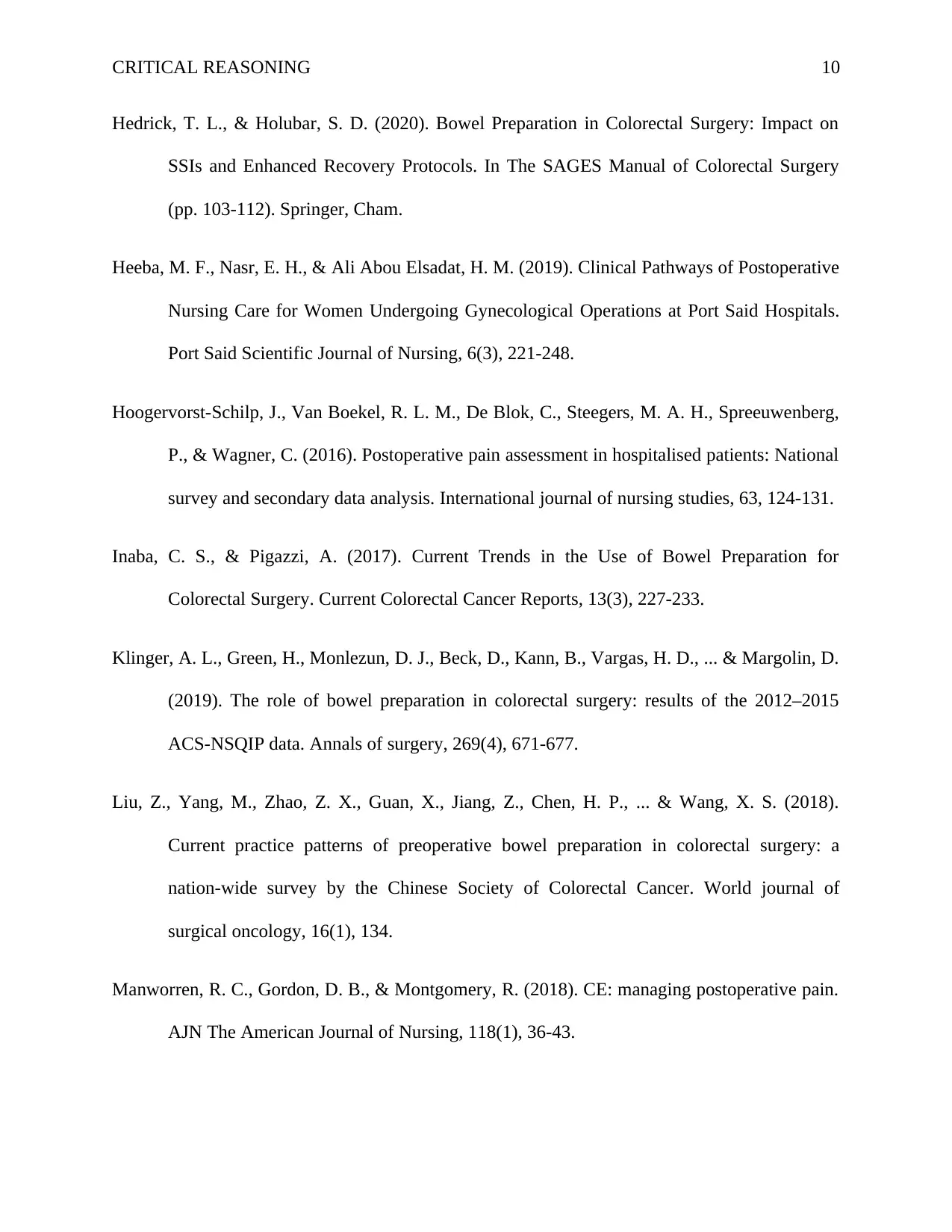
CRITICAL REASONING 10
Hedrick, T. L., & Holubar, S. D. (2020). Bowel Preparation in Colorectal Surgery: Impact on
SSIs and Enhanced Recovery Protocols. In The SAGES Manual of Colorectal Surgery
(pp. 103-112). Springer, Cham.
Heeba, M. F., Nasr, E. H., & Ali Abou Elsadat, H. M. (2019). Clinical Pathways of Postoperative
Nursing Care for Women Undergoing Gynecological Operations at Port Said Hospitals.
Port Said Scientific Journal of Nursing, 6(3), 221-248.
Hoogervorst-Schilp, J., Van Boekel, R. L. M., De Blok, C., Steegers, M. A. H., Spreeuwenberg,
P., & Wagner, C. (2016). Postoperative pain assessment in hospitalised patients: National
survey and secondary data analysis. International journal of nursing studies, 63, 124-131.
Inaba, C. S., & Pigazzi, A. (2017). Current Trends in the Use of Bowel Preparation for
Colorectal Surgery. Current Colorectal Cancer Reports, 13(3), 227-233.
Klinger, A. L., Green, H., Monlezun, D. J., Beck, D., Kann, B., Vargas, H. D., ... & Margolin, D.
(2019). The role of bowel preparation in colorectal surgery: results of the 2012–2015
ACS-NSQIP data. Annals of surgery, 269(4), 671-677.
Liu, Z., Yang, M., Zhao, Z. X., Guan, X., Jiang, Z., Chen, H. P., ... & Wang, X. S. (2018).
Current practice patterns of preoperative bowel preparation in colorectal surgery: a
nation-wide survey by the Chinese Society of Colorectal Cancer. World journal of
surgical oncology, 16(1), 134.
Manworren, R. C., Gordon, D. B., & Montgomery, R. (2018). CE: managing postoperative pain.
AJN The American Journal of Nursing, 118(1), 36-43.
Hedrick, T. L., & Holubar, S. D. (2020). Bowel Preparation in Colorectal Surgery: Impact on
SSIs and Enhanced Recovery Protocols. In The SAGES Manual of Colorectal Surgery
(pp. 103-112). Springer, Cham.
Heeba, M. F., Nasr, E. H., & Ali Abou Elsadat, H. M. (2019). Clinical Pathways of Postoperative
Nursing Care for Women Undergoing Gynecological Operations at Port Said Hospitals.
Port Said Scientific Journal of Nursing, 6(3), 221-248.
Hoogervorst-Schilp, J., Van Boekel, R. L. M., De Blok, C., Steegers, M. A. H., Spreeuwenberg,
P., & Wagner, C. (2016). Postoperative pain assessment in hospitalised patients: National
survey and secondary data analysis. International journal of nursing studies, 63, 124-131.
Inaba, C. S., & Pigazzi, A. (2017). Current Trends in the Use of Bowel Preparation for
Colorectal Surgery. Current Colorectal Cancer Reports, 13(3), 227-233.
Klinger, A. L., Green, H., Monlezun, D. J., Beck, D., Kann, B., Vargas, H. D., ... & Margolin, D.
(2019). The role of bowel preparation in colorectal surgery: results of the 2012–2015
ACS-NSQIP data. Annals of surgery, 269(4), 671-677.
Liu, Z., Yang, M., Zhao, Z. X., Guan, X., Jiang, Z., Chen, H. P., ... & Wang, X. S. (2018).
Current practice patterns of preoperative bowel preparation in colorectal surgery: a
nation-wide survey by the Chinese Society of Colorectal Cancer. World journal of
surgical oncology, 16(1), 134.
Manworren, R. C., Gordon, D. B., & Montgomery, R. (2018). CE: managing postoperative pain.
AJN The American Journal of Nursing, 118(1), 36-43.
Paraphrase This Document
Need a fresh take? Get an instant paraphrase of this document with our AI Paraphraser
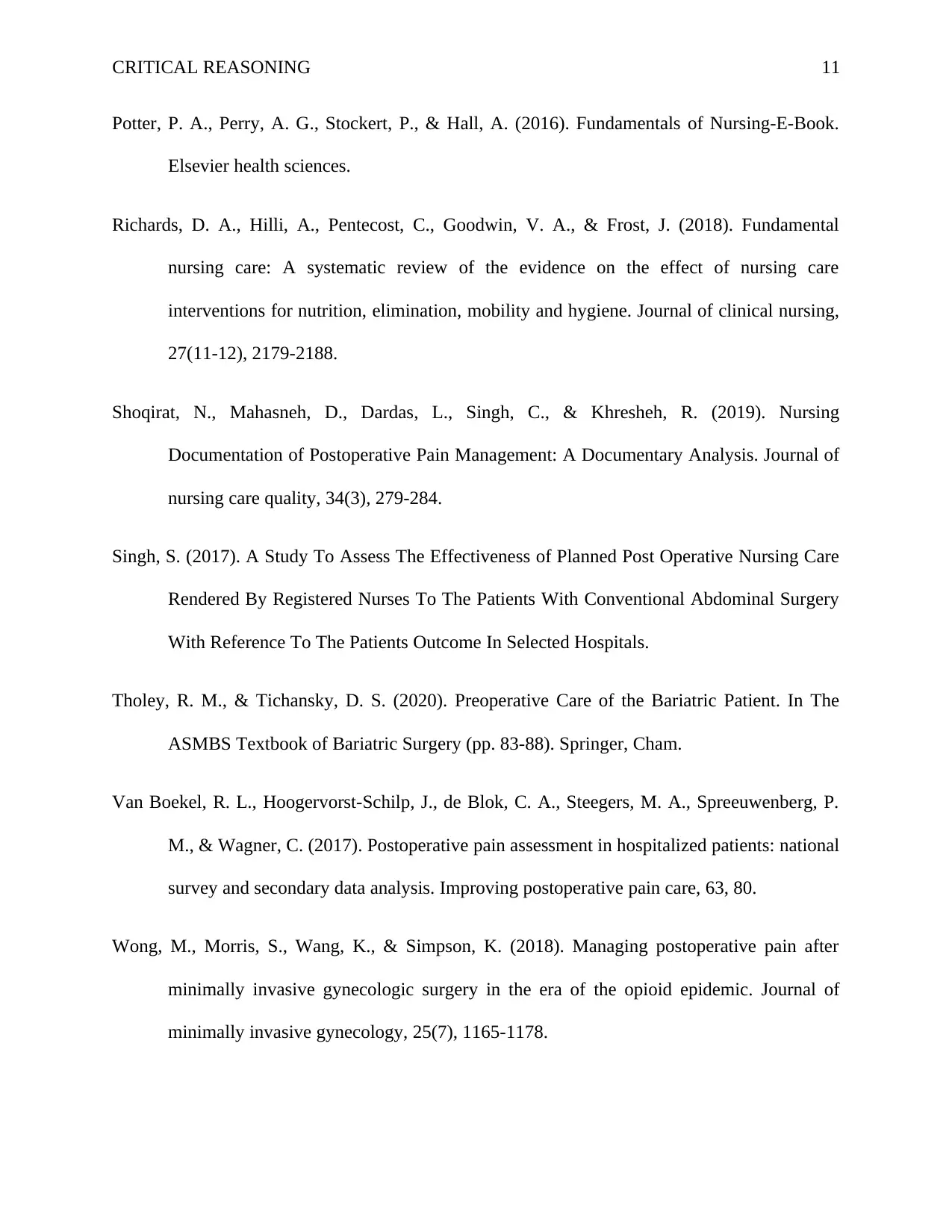
CRITICAL REASONING 11
Potter, P. A., Perry, A. G., Stockert, P., & Hall, A. (2016). Fundamentals of Nursing-E-Book.
Elsevier health sciences.
Richards, D. A., Hilli, A., Pentecost, C., Goodwin, V. A., & Frost, J. (2018). Fundamental
nursing care: A systematic review of the evidence on the effect of nursing care
interventions for nutrition, elimination, mobility and hygiene. Journal of clinical nursing,
27(11-12), 2179-2188.
Shoqirat, N., Mahasneh, D., Dardas, L., Singh, C., & Khresheh, R. (2019). Nursing
Documentation of Postoperative Pain Management: A Documentary Analysis. Journal of
nursing care quality, 34(3), 279-284.
Singh, S. (2017). A Study To Assess The Effectiveness of Planned Post Operative Nursing Care
Rendered By Registered Nurses To The Patients With Conventional Abdominal Surgery
With Reference To The Patients Outcome In Selected Hospitals.
Tholey, R. M., & Tichansky, D. S. (2020). Preoperative Care of the Bariatric Patient. In The
ASMBS Textbook of Bariatric Surgery (pp. 83-88). Springer, Cham.
Van Boekel, R. L., Hoogervorst-Schilp, J., de Blok, C. A., Steegers, M. A., Spreeuwenberg, P.
M., & Wagner, C. (2017). Postoperative pain assessment in hospitalized patients: national
survey and secondary data analysis. Improving postoperative pain care, 63, 80.
Wong, M., Morris, S., Wang, K., & Simpson, K. (2018). Managing postoperative pain after
minimally invasive gynecologic surgery in the era of the opioid epidemic. Journal of
minimally invasive gynecology, 25(7), 1165-1178.
Potter, P. A., Perry, A. G., Stockert, P., & Hall, A. (2016). Fundamentals of Nursing-E-Book.
Elsevier health sciences.
Richards, D. A., Hilli, A., Pentecost, C., Goodwin, V. A., & Frost, J. (2018). Fundamental
nursing care: A systematic review of the evidence on the effect of nursing care
interventions for nutrition, elimination, mobility and hygiene. Journal of clinical nursing,
27(11-12), 2179-2188.
Shoqirat, N., Mahasneh, D., Dardas, L., Singh, C., & Khresheh, R. (2019). Nursing
Documentation of Postoperative Pain Management: A Documentary Analysis. Journal of
nursing care quality, 34(3), 279-284.
Singh, S. (2017). A Study To Assess The Effectiveness of Planned Post Operative Nursing Care
Rendered By Registered Nurses To The Patients With Conventional Abdominal Surgery
With Reference To The Patients Outcome In Selected Hospitals.
Tholey, R. M., & Tichansky, D. S. (2020). Preoperative Care of the Bariatric Patient. In The
ASMBS Textbook of Bariatric Surgery (pp. 83-88). Springer, Cham.
Van Boekel, R. L., Hoogervorst-Schilp, J., de Blok, C. A., Steegers, M. A., Spreeuwenberg, P.
M., & Wagner, C. (2017). Postoperative pain assessment in hospitalized patients: national
survey and secondary data analysis. Improving postoperative pain care, 63, 80.
Wong, M., Morris, S., Wang, K., & Simpson, K. (2018). Managing postoperative pain after
minimally invasive gynecologic surgery in the era of the opioid epidemic. Journal of
minimally invasive gynecology, 25(7), 1165-1178.
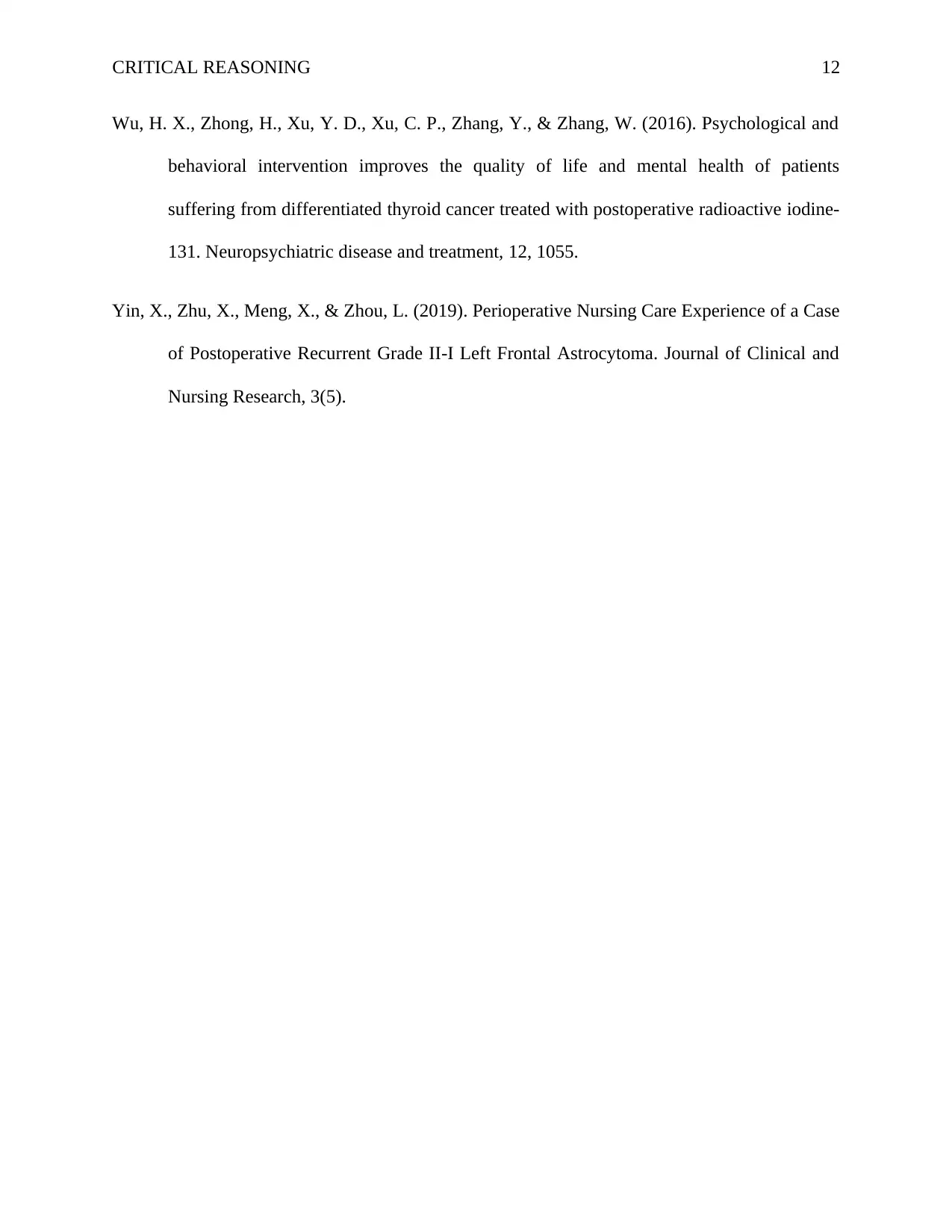
CRITICAL REASONING 12
Wu, H. X., Zhong, H., Xu, Y. D., Xu, C. P., Zhang, Y., & Zhang, W. (2016). Psychological and
behavioral intervention improves the quality of life and mental health of patients
suffering from differentiated thyroid cancer treated with postoperative radioactive iodine-
131. Neuropsychiatric disease and treatment, 12, 1055.
Yin, X., Zhu, X., Meng, X., & Zhou, L. (2019). Perioperative Nursing Care Experience of a Case
of Postoperative Recurrent Grade II-I Left Frontal Astrocytoma. Journal of Clinical and
Nursing Research, 3(5).
Wu, H. X., Zhong, H., Xu, Y. D., Xu, C. P., Zhang, Y., & Zhang, W. (2016). Psychological and
behavioral intervention improves the quality of life and mental health of patients
suffering from differentiated thyroid cancer treated with postoperative radioactive iodine-
131. Neuropsychiatric disease and treatment, 12, 1055.
Yin, X., Zhu, X., Meng, X., & Zhou, L. (2019). Perioperative Nursing Care Experience of a Case
of Postoperative Recurrent Grade II-I Left Frontal Astrocytoma. Journal of Clinical and
Nursing Research, 3(5).
⊘ This is a preview!⊘
Do you want full access?
Subscribe today to unlock all pages.

Trusted by 1+ million students worldwide
1 out of 12
Related Documents
Your All-in-One AI-Powered Toolkit for Academic Success.
+13062052269
info@desklib.com
Available 24*7 on WhatsApp / Email
![[object Object]](/_next/static/media/star-bottom.7253800d.svg)
Unlock your academic potential
Copyright © 2020–2026 A2Z Services. All Rights Reserved. Developed and managed by ZUCOL.





